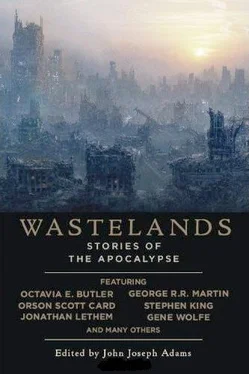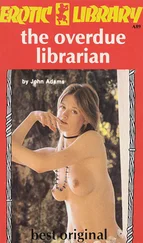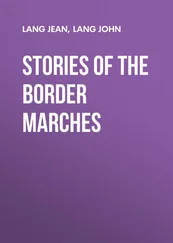“I went swimming. You can’t keep an eye on the thing all the time.”
“It’s going to take forever to fix this,” she fumed.
“We should warm up the hunter,” I said. “It’ll be easier to work on it back home.” Lisa and I knelt down to start cutting the dog free. It whimpered and its tail wagged feebly as we started to work.
Jaak was silent.
Lisa slapped him on his leg. “Come on, Jaak, get down here. It’ll bleed out if you don’t hurry up. You know how fragile it is.”
Jaak said, “I think we should eat it.”
Lisa glanced up, surprised. “You do?”
He shrugged. “Sure.”
I looked up from where I was tearing away tangled wires from around the dog’s torso. “I thought you wanted it to be your pet. Like in the zoo.”
Jaak shook his head. “Those food pellets are expensive. I’m spending half my salary on food and water filtration, and now this bullshit.” He waved his hand at the tangled dog. “You have to watch the sucker all the time. It’s not worth it.”
“But still, it’s your friend. It shook hands with you.”
Jaak laughed. “You’re my friend.” He looked down at the dog, his face wrinkled with thought. “It’s, it’s…an animal.”
Even though we had all idly discussed what it would be like to eat the dog, it was a surprise to hear him so determined to kill it. “Maybe you should sleep on it.” I said. “We can get it back to the bunker, fix it up, and then you can decide when you aren’t so pissed off about it.”
“No.” He pulled out his harmonica and played a few notes, a quick jazzy scale. He took the harmonica out of his mouth. “If you want to put up the money for his feed, I’ll keep it, I guess, but otherwise.…” He shrugged.
“I don’t think you should cook it.”
“You don’t?” Lisa glanced at me. “We could roast it, right here, on the beach.”
I looked down at the dog, a mass of panting, trusting animal. “I still don’t think we should do it.”
Jaak looked at me seriously. “You want to pay for the feed?”
I sighed. “I’m saving for the new Immersive Response.”
“Yeah, well, I’ve got things I want to buy too, you know.” He flexed his muscles, showing off his tattoos. “I mean, what the fuck good does it do?”
“It makes you smile.”
“Immersive Response makes you smile. And you don’t have to clean up after its crap. Come on, Chen. Admit it. You don’t want to take care of it either. It’s a pain in the ass.”
We all looked at each other, then down at the dog.
* * *
Lisa roasted the dog on a spit, over burning plastics and petroleum skimmed from the ocean. It tasted okay, but in the end it was hard to understand the big deal. I’ve eaten slagged centaur that tasted better.
Afterward, we walked along the shoreline. Opalescent waves crashed and roared up the sand, leaving jewel slicks as they receded and the Sun sank red in the distance.
Without the dog, we could really enjoy the beach. We didn’t have to worry about whether it was going to step in acid, or tangle in barb-wire half-buried in the sand, or eat something that would keep it up vomiting half the night.
Still, I remember when the dog licked my face and hauled its shaggy bulk onto my bed, and I remember its warm breathing beside me, and sometimes, I miss it.
Bread and Bombs
by M. Rickert
Mary Rickert’s stories have been appearing regularly in The Magazine of Fantasy & Science Fiction for several years, starting in 1999 with her first publication, “The Girl Who Ate Butterflies.” Her work has also appeared in SCI FICTION and the anthology Feeling Very Strange , and has been nominated for the Nebula Award. Her collection, Map of Dreams , won the William L. Crawford Award for best first book-length work of fantasy.
Rickert says that she wrote this story in response to news reports concerning food packages being dropped in Afghanistan which were wrapped in the same color packaging as bombs — which detonated when picked up by hungry children. Many authors have been moved to write 9/11 stories; this is Rickert’s.
The strange children of the Manmensvitzender family did not go to school so we only knew they had moved into the old house on the hill because Bobby had watched them move in with their strange assortment of rocking chairs and goats. We couldn’t imagine how anyone would live there, where the windows were all broken and the yard was thorny with brambles. For a while we expected to see the children, two daughters who, Bobby said, had hair like smoke and eyes like black olives, at school. But they never came.
We were in the fourth grade, that age that seems like waking from a long slumber into the world the adults imposed, streets we weren’t allowed to cross, things we weren’t allowed to say, and crossing them, and saying them. The mysterious Manmensvitzender children were just another in a series of revelations that year, including the much more exciting (and sometimes disturbing) evolution of our bodies. Our parents, without exception, had raised us with this subject so thoroughly explored that Lisa Bitten knew how to say vagina before she knew her address and Ralph Linster delivered his little brother, Petey, when his mother went into labor one night when it suddenly started snowing before his father could get home. But the real significance of this information didn’t start to sink in until that year. We were waking to the wonders of the world and the body; the strange realizations that a friend was cute, or stinky, or picked her nose, or was fat, or wore dirty underpants, or had eyes that didn’t blink when he looked at you real close and all of a sudden you felt like blushing.
When the crab apple tree blossomed a brilliant pink, buzzing with honey bees, and our teacher, Mrs. Graymoore, looked out the window and sighed, we passed notes across the rows and made wild plans for the school picnic, how we would ambush her with water balloons and throw pies at the principal. Of course none of this happened. Only Trina Needles was disappointed because she really believed it would but she still wore bows in her hair and secretly sucked her thumb and was nothing but a big baby.
Released into summer we ran home or biked home shouting for joy and escape and then began doing everything we could think of, all those things we’d imagined doing while Mrs. Graymoore sighed at the crab apple tree which had already lost its brilliance and once again looked ordinary. We threw balls, rode bikes, rolled skateboards down the driveway, picked flowers, fought, made up, and it was still hours before dinner. We watched TV, and didn’t think about being bored, but after a while we hung upside down and watched it that way, or switched the channels back and forth or found reasons to fight with anyone in the house. (I was alone, however and could not indulge in this.) That’s when we heard the strange noise of goats and bells. In the mothy gray of TV rooms, we pulled back the drapes, and peered out windows into a yellowed sunlight.
The two Manmensvitzender girls in bright clothes the color of a circus, and gauzy scarves, one purple, the other red, glittering with sequins came rolling down the street in a wooden wagon pulled by two goats with bells around their necks. That is how the trouble began. The news accounts never mention any of this; the flame of crab apple blossoms, our innocence, the sound of bells. Instead they focus on the unhappy results. They say we were wild. Uncared for. Strange. They say we were dangerous. As if life was amber and we were formed and suspended in that form, not evolved into that ungainly shape of horror, and evolved out of it, as we are, into a teacher, a dancer, a welder, a lawyer, several soldiers, two doctors, and me, a writer.
Читать дальше












